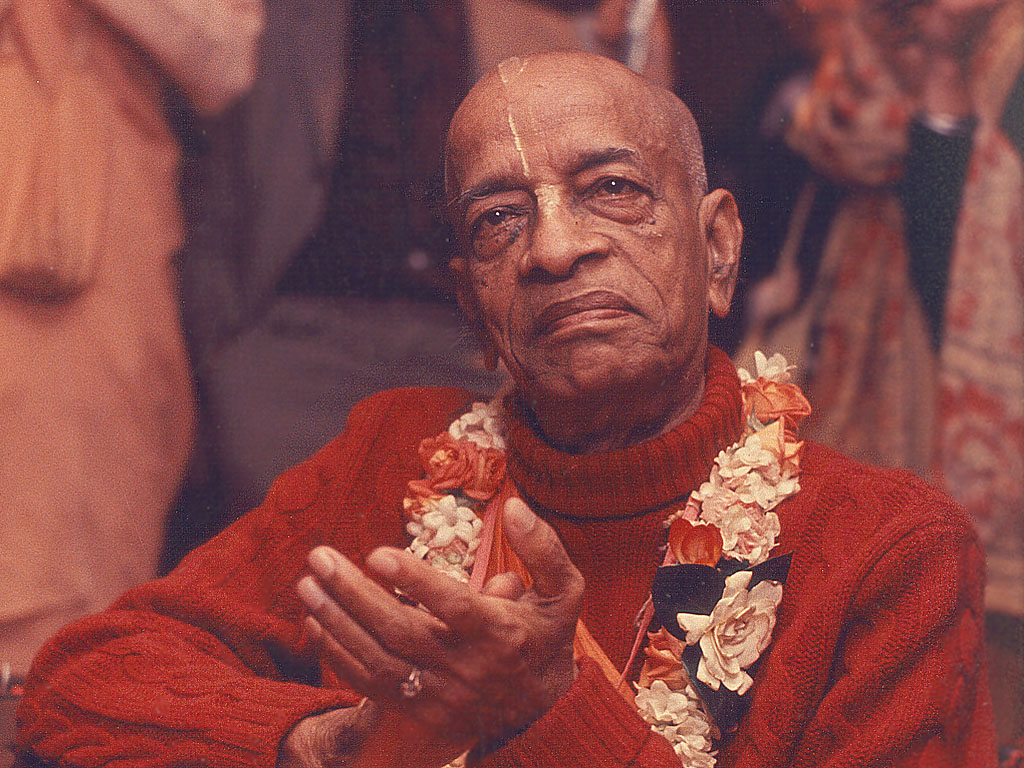Для того, кто желает обрести счастье и освободиться от всех страданий и тревог, медитация представляет очень важный аспект деятельности.
Медитация означает «мысленное созерцание», но ведь у созерцания должен быть объект. И чтобы избавиться от повседневных тревог, занимающих ум, человек должен подняться над материальным уровнем и попытаться утвердиться на трансцендентном, духовном уровне. Сделать это можно, если постоянно повторять имена Господа, таким образом общаясь с Ним.
Как утверждается в различных писаниях, у Господа много имен: Кришна, Рама, Иегова, Аллах, Будда и др. Повторение имен Господа, Мантра медитация, оказывает очищающее воздействие и позволяет человеку подняться с материального уровня на духовный. В Индии на протяжении тысячелетий люди повторяют имена Господа в виде мантр. На санскрите Мана означает «ум», а трая — «освобождение». Таким образом, мантра — это комбинация трансцендентных звуков, освобождающая наш ум от тревог.
В ведических писаниях приводится мантра, которую называют Маха-мантрой, т.е. великой мантрой. В «Кали-сантарана-упанишаде» говорится, что шестнадцать слов, составляющих ее — Харе Кришна, Харе Кришна, Кришна Кришна, Харе Харе / Харе Рама, Харе Рама, Рама Рама, Харе Харе, — особенно рекомендуется повторять в Кали-югу, наш век раздоров, тревог и лицемерия.
Кришна означает «всепривлекающий», Рама — «всерадующий», а Харе — это обращение к энергии преданного служения Господу. Таким образом, Маха-мантра означает: «О Всепривлекающий, о Всерадующий Господь, о духовная энергия Господа! Прошу, позволь мне преданно служить Тебе».
Для медитации, чтения Маха-мантры Харе Кришна не существует строгих правил. Самое замечательное в мантра-медитации то, что ею можно заниматься где угодно и в любое время — дома, на море или, когда вы едете, скажем, в автобусе или на метро.
Существует два вида мантра-медитации: индивидуальная, при которой человек читает мантру на четках (это называется джапой), и когда он повторяет ее вслед за кем-то (это называется киртаном). Киртан обычно сопровождается игрой на музыкальных инструментах и хлопанием в ладоши. Рекомендуется и та и другая форма мантра-медитации, так как обе они благотворно влияют на человека.
Джапа медитация
Для этого вида мантра-медитации нужны лишь круговые четки. Их можно купить в магазине или сделать самим, следуя приведенным ниже простым рекомендациям:
Купите 109 больших круглых деревянных бусин (если нет деревянных, на первое время возьмите любые другие) диаметром от одного до двух сантиметров с отверстиями, чтобы можно было нанизать их на нить, а также от трех до пяти метров крепкой нейлоновой нити.
Отступите пятнадцать сантиметров от конца нити и завяжите узел, затем, нанизывая по одной бусине, после каждой завязывайте одинарный или двойной узел, в зависимости от толщины нити .
Нанизав сто восемь бусин, проденьте оба конца нити в последнюю бусину.
Эта бусина называется бусиной Кришны, и хорошо, если она больше остальных. Продев в нее оба конца нити, завяжите узел и обрежьте концы нити. Четки для джапы готовы.
Начиная мантра-медитацию, зажмите бусину, следующую за бусиной Кришны, между большим и средним пальцами правой руки (рис.3) и произнесите всю Маха-мантру: Харе Кришна, Харе Кришна, Кришна Кришна, Харе Харе / Харе Рама, Харе Рама, Рама Рама, Харе Харе. Затем точно так же зажмите в пальцах следующую бусину и снова произнесите Маха-мантру, затем следующую. . . и так пока не повторите мантру на каждой бусине четок и не дойдете до бусины Кришны.
Вы прочитали один «круг» джапы. Чтение одного круга должно отнимать у вас около семи минут, хотя вначале на это может уйти и десять минут, и больше. Не читая мантру на бусине Кришны, нужно повернуть четки и двигаться по кругу в обратном направлении. Четки очень важны для джапы (мантра-медитации), они помогают лучше сосредоточиться на звуках мантры, вовлекая в медитационный процесс осязание.
Если вы дали обет читать определенное число кругов в день, чтобы не запутаться, вам хорошо иметь небольшой шнурок с нанизанными на нем бусинами по числу кругов, которые вы читаете ежедневно. Между этими бусинами не надо завязывать узлы, нужно завязать их только на концах шнурка, чтобы бусины не соскочили с него. Закончив круг, передвиньте одну счетную бусину вниз.
Вы можете читать мантру в помещении или на свежем воздухе, ее можно читать так громко или так тихо, как вам нравится, но достаточно громко, чтобы было слышно вам самим. Самое главное — произносите каждое слово четко и ясно. Ваш ум, возможно, захочет переключиться на какие-нибудь посторонние мысли, поскольку он беспокоен, неустойчив и всегда хочет думать о чем-нибудь. Попытайтесь сосредоточить все свое внимание на чтении Харе Кришна Маха-мантры и вслушивайтесь в каждое слово.
Читать мантру можно в любое время дня, но в ведической литературе указываются определенные часы, наиболее благоприятные для духовной практики. Самыми благотворными для духовного развития являются ранние утренние часы. Хорошо, если вы отведете для чтения мантры определенное время дня, всегда одно и то же. Начните с чтения одного или двух кругов в день и постепенно увеличьте их число до шестнадцати; это — рекомендованный минимум для того, кто относится к джапа-медитации серьезно и хочет стать преданным Господа Кришны.



